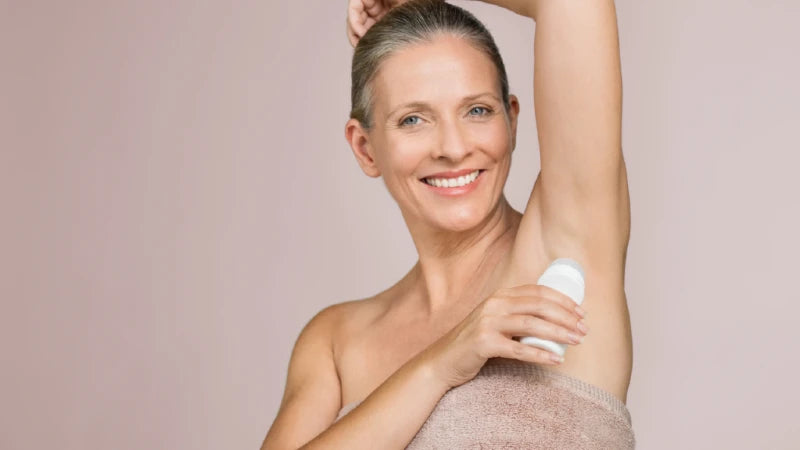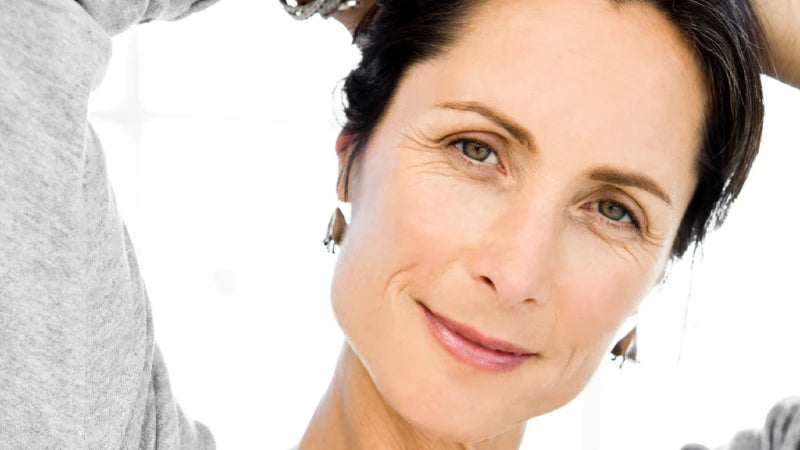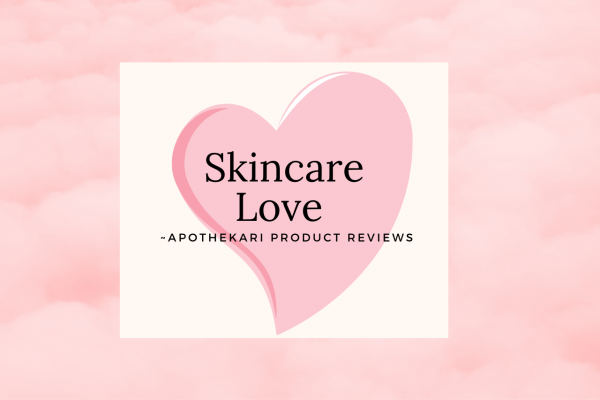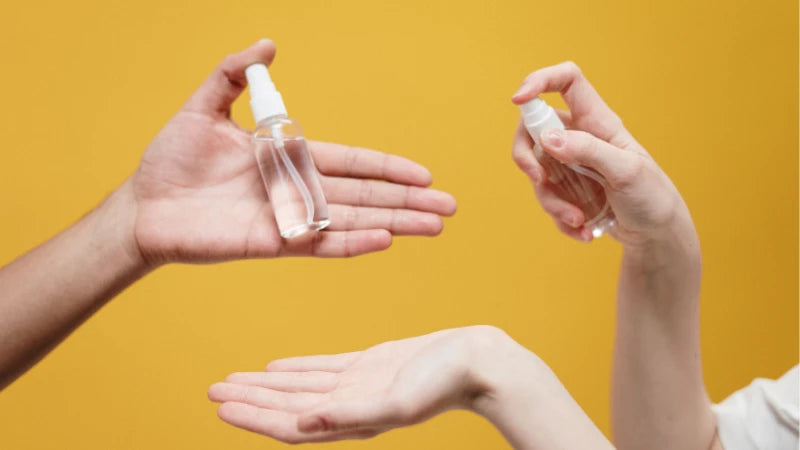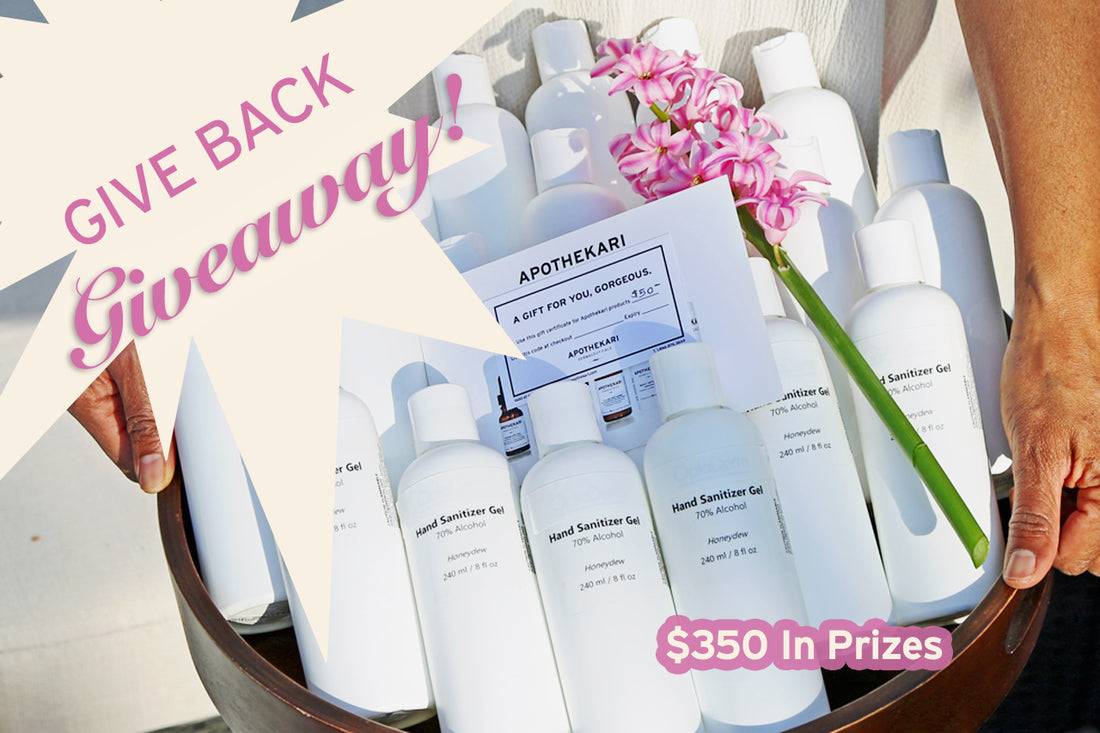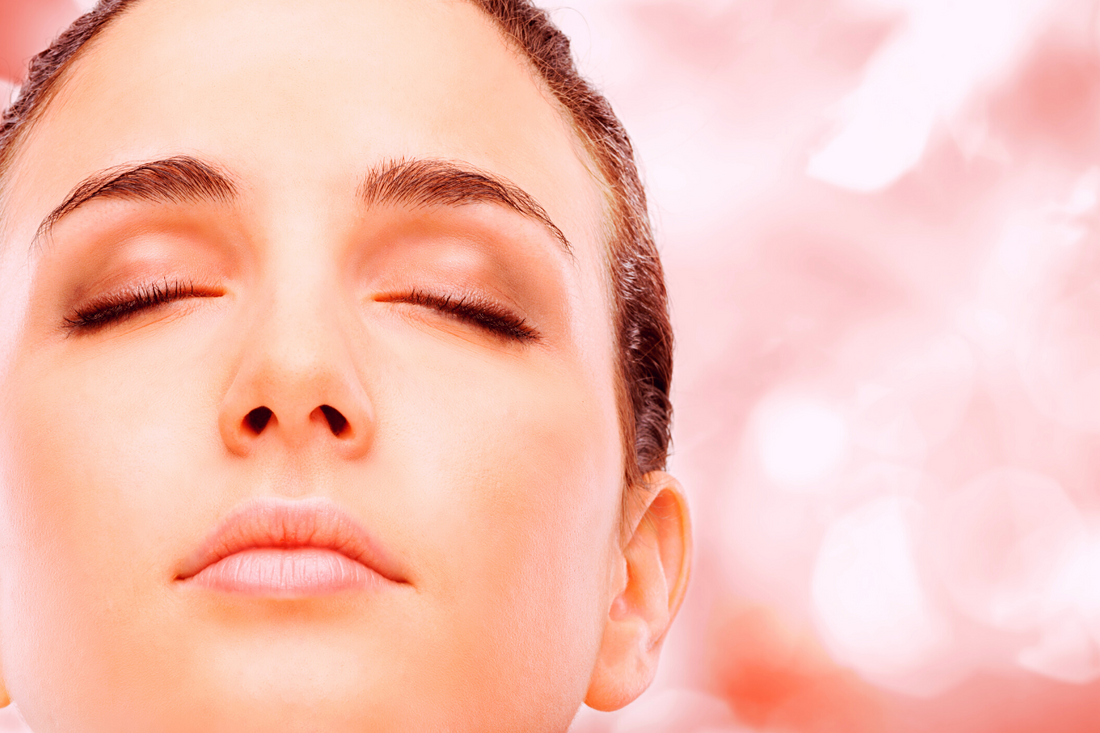Blog
How To Look After Summer Skin | 7 of the Best Tips
We’re sharing 7 of the best tips to help you keep your summer skin looking radiant and beautiful this season and beyond. If you love the summertime as much I do, this is a must read! Shop All Apothekari How Can I Care For My Skin in the Summer? 1. First, Put on Your Sunscreen Remember when you were 10 and your mom sent you outside to play with your friends during summer break? ALL DAY LONG (you could only come in to pee and if you were lucky, maybe she’d give you a popsicle?). And sunscreen wasn’t a thing? Yeah, me too. I didn’t suffer too badly, because I don’t really burn, but I do remember some very pink faces in the neighborhood. More than the pain though—and we probably didn’t know it back then—that sunburn caused significant skin damage, increasing the chances of dark spots, roughness and dry, wrinkled skin. If you suffered a burn, it also increased your risk for skin cancers such as melanoma. This is why it’s so important to protect your skin against sun damage. The first step in protecting summer skin is to guard it from harm that can be caused by exposure to ultraviolet rays: Find and use a broad spectrum (minimum SPF 30) sunscreen that protects against both UVA and UVB rays. Don’t forget to apply to your ears, lips and tops of feet – most of us miss these areas. Seek out shady places whenever you’re out and about, especially during the sun’s peak hours between 10 am and 4 pm. Cover up with long sleeves and hats when you can. The sun can also burn your eyes, harming the retina, lens or cornea so make sure to protect your peepers with sunglasses and hats. 2. Antioxidants Rescue Summer Skin! While sunscreen is essential during hot weather, you may not know that you can amp up its protection. Meet sunscreen’s partner in crime, antioxidants. Sunscreens help to reduce the risk of skin cancer and premature skin aging, but you get even better protection if you combine sunscreen with an antioxidant. Even if you wear sunscreen every day, you’re not going to get 100% protection from the sun’s rays. An SPF 50+ sunscreen equals about 98% protection from UVB rays. Plus, most of us don’t apply nearly enough sunscreen (or as often enough) as we should to get the protection stated on the label. Just the smallest amount of residual UV exposure can trigger the development of free radicals, unstable molecules that can accelerate skin aging. Like unprotected sun exposure, free radicals can lead to wrinkles, dark spots, loss of firmness, and other issues. You may not be able to see or feel free radical damage, but it’s happening, just at a deeper level and the results will show up over time. Antioxidants help make up for what sunscreen can’t do – they protect against the free radical damage that exposure to sunlight causes. So even if you haven’t applied enough sunscreen—or forget to reapply—antioxidants neutralize the free-radical damage that’s caused by sun exposure. They also help defend skin from other sources of free radicals, such as pollution, smoke, high-energy visible (HEV) light and blue light from your cell phone. There isn’t a single BEST antioxidant but there are lots of amazing ones. Vitamins C and E are two of the most widely studied, but there are many others that also offer benefits, including ferulic acid, green tea, resveratrol and coenzyme Q10. When it comes to antioxidants, the more the merrier. A highly effective combination is available in our Bespoke Vitamin C Serum. Apply it every morning underneath your sunscreen. It not only protects, but will also help to deliver an irresistible glow. Ready for healthy, glowing skin in your 40s and beyond? Click here to download our FREE guide containing 5 tips to help you feel good and look your best as you ride the waves of your body’s changes. Treat the skin on all your body’s places with safe, effective products plus advice that will allow you to age with confidence, comfort and grace. 3. Correction 101 Sun damage can occur even with the consistent use of a sunscreen and an antioxidant. This is why you need to incorporate a retinoid into your routine. Derived from vitamin A, retinoids help to fight against skin damage associated with the sun. They’ve been shown to help boost the production of collagen and elastin for firmer, more supple skin; reduce the appearance of fine lines and wrinkles; brighten skin tone, reduce the appearance of dark spots and leave skin feeling smoother overall. Our A is for Anti-Aging Serum contains gentle yet highly effective retinaldehyde, making it suitable for almost all skin types. The formulation also reduces redness and increases skin’s moisture content. It’s no wonder we’ve dubbed A is for Anti-Aging, ‘a miracle for skin’—if one existed. 4. Summer Skin Needs Lighter Moisture Depending on where you live and your skin type, you may need to swap out your moisturizer. If it’s especially humid and your skin isn’t feeling dry, you may find that you don’t need a moisturizer—your morning serum and sunscreen may be all that you need. If you’ve been using face oils, you may want to give them a rest until cooler, drier weather arrives. Our Daily Infusion Moisturizer plumps, protects and refreshes skin without any hint of oiliness. It’s THE perfect year round moisturizer and ideal for summer skin. 5. Drink Up! Water of course! Drinking more water can’t fix dry skin but it does help it to function well by delivering nutrients to it. Make your daily hydration that much more special with ‘spa water’—cut up some fruit, add in some herbs and some ice. The flavors infuse the water, giving it a wonderful lift. 6. How Can I Get Glowing Skin in Summer? (Hint: Exfoliate!) Dead, dry skin cells that sit on the surface can leave your skin looking dull and lifeless. If you’re using our Bespoke Vitamin C Serum, you may be able to skip a facial exfoliant because the low pH L-ascorbic acid exfoliates. However, if you’re after additional exfoliation, add in a treatment that contains an alpha hydroxy acid like glycolic acid, lactic acid or malic acid. Use it once or twice a week at night, making sure to skip your retinoid treatment on those nights—the combination may be too much for most skin types. And, don’t forget your body—see tip 7 for how to take care of the rest of your skin. 7. Don’t Forget ALL Your Body’s Places We obsess over our faces but often neglect the skin on the rest of our body. Pay attention especially to these areas: Feet. Which can get rough from going barefeet or wearing sandals. Exfoliate with a scrub or pumice and slather on a moisturizing treatment like our Shea Body Butter or Lemon Rose Body Oil to lock in hydration. Neck. Shorter necklines leave our neck exposed to damage, much like our faces. Make it a habit to apply sunscreen and follow the same regimen as you do for your face. It’s important year round, but especially during the summer. Back of Hands. Much like your neck, your hands are prone to sun damage. Give them the same amount of care as your neck and face. Moisturize regularly, especially after showering or bathing or washing dishes. Taking care of the skin on your body is fantastic way to slip in some me time, ensuring that you aren’t neglecting your self care. Here’s to a safe and healthy, happy summer!
Learn moreSweat Facts: 7 Things We Need to Clear Up About Your Deodorant
Let’s talk about sweat facts. In particular, many of the myths surrounding natural deodorants. Because when it comes to this topic, there’s no shortage of information on the internet. Sadly, many of them make no sense at all. We’re discussing 7 that it’s time to bust. Let’s go! Shop All Apothekari Natural Deodorants For EVERYTHING you wanted to know about natural deodorant, read this post. Why Do We Sweat? Facts When it comes to sweating and body odor, there are lots of misconceptions. Time to set the facts straight. Myth 1: Do You Have to Detox Before Using a Natural Deodorant? One of the biggest cringeworthy sweat facts advice floating around is that when it comes to using deodorants is that you need to do a ‘detox’ when switching over from an antiperspirant to a deodorant. Truth: First, your skin isn’t a “detox” organ. That’s what our livers are for. The main purpose of skin is to act as a barrier – keeping harmful substances out and the good ones in. Second, there’s absolutely no evidence to support the notion of detox when it comes to deodorant. As you transition over from using an anti-perspirant to a deodorant, the antiperspirant plugs that block sweat glands will dissipate until they are no longer blocking the glands. This occurs naturally and there’s nothing you can do to help the process along. You may start sweating more. And, the bacteria that live on your skin will feed on this sweat, leading to odor. Enter your deodorant. It’s as simple as stopping the antiperspirant one day and applying a deodorant the next. No product is required to help the process along. Myth 2: Is It Safe to Use Baking Soda As a Deodorant? The truth? Baking soda may be good for cleaning your kitchen sink, but it’s an ingredient that you should avoid putting on your skin. Baking soda (also known as sodium bicarbonate) has a high pH. This makes it highly irritating to skin, which is slightly acidic (much lower pH). Applying baking soda not only disrupts the skin’s pH, it also disturbs your skin’s protective barrier and its microbiome (the collection of bacteria that help keep skin healthy). It can be very irritating, leading to rashes, redness or burning. Myth 3: Is Magnesium Hydroxide Safe in Deodorant? Truth: The pH of magnesium hydroxide is even higher than that of baking soda, making it potentially even more irritating than baking soda! (so the answer is no!) Myth 4: Can You Use Kaolin Clay in Deodorant? Yes, you can because kaolin clay absorbs wetness, thereby reducing odor. Truth: Here’s the problem—If you’ve switched to a deodorant because you want to avoid the aluminum in an anti-perspirant, you may be interested to learn that kaolin clay is made up of several minerals including kaolin, silicon and aluminum!If you’re trying to avoid aluminum, you should avoid deodorants containing kaolin clay as well. Myth 5: Are Parabens Linked to Cancer? Parabens are a class of highly effective preservatives used to keep foods and cosmetics safe. A 2004 British study found traces of parabens in the breast tissue of 19 out of 20 women. And, because parabens have some mild estrogenic effect, some researchers concluded that parabens are linked to breast cancer and reproductive issues. Truth: Although it’s often touted about as a scientific sweat fact, it’s important to note that parabens are included in cosmetics at very low percentages and that their estrogenic effect is very, very mild. Parabens are also found naturally in foods. Estrogen can play a role in breast cancer, but there is no evidence that people who use paraben-containing products face an increased risk. We can’t say that they’re categorically bad for us, but if you are concerned, other preservatives are available. All Apothekari products are paraben free. Myth 6: Is Aluminum in Deodorant Harmful? Truth: While it’s been suggested that there’s a possible connection between aluminum and breast cancer, there’s no scientific evidence that links its use to the development of breast cancer. In fact, a 2014 review concluded there was no clear evidence showing that the use of aluminum-containing underarm antiperspirants or cosmetics increases the risk of breast cancer (5) Willhite CC, Karyakina NA, Yokel RA, et al. Systematic review of potential health risks posed by pharmaceutical, occupational and consumer exposures to metallic and nanoscale aluminum, aluminum oxides, aluminum hydroxide and its soluble salts. Critical Reviews in Toxicology 2014; 44 Suppl 4:1-80. The Alzheimer’s concern? A few studies from the 1960s found high levels of aluminum in the brains of Alzheimer’s patients. But the findings haven’t been replicated in later research and the conclusion is that there isn’t any link between the two. The real problem with aluminum? It stains your white clothes yellow. And, many people are sensitive to it. These are the real reasons to avoid using aluminum. You’ll be pleased to know that Apothekari deodorants are aluminum free. Myth 7: Do You Really Need to Use Deodorant? I absolutely (DEFINITELY) need it, but you may not! Truth: Research has shown that if you possess a gene called ABCC11, that you may not need a deodorant! Researchers have known about this gene for a while, although most of the work on it has focused on its connection to earwax–people with this gene variant are more likely to have “dry” earwax, compared to “wet” or “sticky”. Although researchers aren’t quite sure how the gene affects both earwax and sweat odor, they believe it has to do with the production of amino acids. When it comes to body odor, the presence of this gene means your armpits produce less of an amino acid that leads to bacteria growth. These bacteria, when combined with sweat, lead to body odor. Fewer bacteria, less odor. It’s thought that only 2 percent or so of the population have this gene and that it’s more common in East Asian populations. Maybe you want to go au naturale to see if you can give it a miss? Any Other Sweat Facts You’d Like to Know? I hope that this post has helped to provide some clarity around the confusion about deodorants. Let us know if you have any questions and we’ll be happy to help.
Learn moreWhat's the Best Way to Layer Skincare Products?
We’ve written about how to layer skincare products before, and this time we’re going a bit deeper. In this post, learn how to layer skincare products the right way to help maximize the benefits of your topical treatments. Shop Antioxidant Face Oil When Should Oil Be Used in Skincare Routine? So you may get some conflicting advice when it comes to when to apply a face oil. Some advise to apply oil before moisturizer, so that it absorbs right into your skin before you slather on more hydration. Others say to apply it after your moisturizer, so that it can help to lock in the hydrating ingredients. To us, it makes more sense to do the latter – apply it after your moisturizer so that it seals everything in. But, if you read our entire blog post, you’ll know that there really isn’t a perfect answer. Just use the face oil! What is the Order of Skin Care Layers? You’d think that a topic like how to build a skincare routine would be relatively easy. Yet, with all the options available to choose from – creams, serums, toners, essences, oils, etc., – finding the right products for your skin can get complicated. Add in how to use these products to maximize their benefits, well that just adds another level of complexity. If you’ve already got a good skincare routine set up and want to learn the best way to layer skincare products, know that the advice is more a rule of thumb rather than anything set in stone. The most common recommendation is to go from thinnest in texture to heaviest in texture, but even if you get it wrong, nothing bad will happen. Breathe a sigh of relief! Want to get the glowing skin of your dreams? Subscribe to our newsletter list and download our free guide: 5 Tips For Glowing Skin. How Important Are the Steps for a Skincare Routine? In general, it’s recommended that you apply your products in order from thinnest to thickest. The rationale is that this helps to ensure the best possible absorption. However, if you mess things up, and the order gets switched around, it’s unlikely to do much harm. That’s because very few products create a bulletproof layer that nothing can penetrate. So, even if you put your heavy cream on before a hydrating serum, the world won’t end. The absorption of that serum through the cream may happen a lot more slowly and you may not get as much to your skin as you would have if you’d applied it first. Additionally, since the goal of the cream is to help lock in the hydration from the serum, you may lose that benefit as well. The same applies to active treatment serums. Ideally, you’ll want the ingredients as close to your skin as possible (think vitamin C, retinoids etc) so it’s best to apply these first for maximum absorption. Then follow with a cream, lotion or oil. Here’s the Correct Order of Skin Care Products Cleanser. It probably doesn’t come as a surprise that cleansers top the list. Single cleanse, double cleanse, warm water splash (often this is fine for many of us in the morning), it should always be the first step. Toner. We’ve always maintained that toners are optional. Not everyone needs to use them and they’re one of the products that you can leave out of your routine easily. However, toners can be useful to help introduce active ingredients like those found in acne treatments. Serum/Exfoliant. Exfoliants and serums like our Bespoke Vitamin C Serum or A is for Anti-Aging Serum often contain lots of active ingredients like antioxidants, retinoids and peptides so it’s a good idea to apply them as close to clean skin as possible. They’re the products that deliver the most skin benefits so it’s important to ensure their optimal absorption. Moisturizer. Whether you opt for a cream or a lotion, moisturizers help to hydrate and plump skin. They can also help to lock in moisture, preventing dry skin. Eye Cream. Sunscreen (AM)/Face Oil (PM). Sunscreen should always be your last step in the morning before you apply make-up. At night, face oil is the very last thing to put on before you get your zzz’s in. If you want to use a face oil in the morning, put it on before your sunscreen. Remember not to apply too much, especially if you’re layering as your skin can only absorb so much. Let us know if you found this helpful.
Learn moreApothekari Reviews: Sharing the Skincare Love
We’re always thrilled (and definitely doing a happy dance) when you review our products and share your skincare love for Apothekari. In this post, here’s just a taste of what our fans are saying. Shop All Apothekari For more Apothekari skincare love, check out all our testimonials. Don’t forget to visit our press page too! Got a review or testimonial you’d like to share with us? Let us know on our social feeds or send us an email.
Learn moreThis is How to Show Off Ageless Skin Effortlessly
Ageless skin, skin that’s healthy, radiant and beautiful, is the goal for most of us.
Learn moreIs Organic Skincare Really Better for You?
If you’re paying closer attention to your health these days, you may be curious whether organic skincare is better. In this post, we’re sharing information that we hope you’ll find useful in making that decision. Read on to learn more. Shop All Apothekari Is Organic Skincare Better? It’s difficult to avoid the claims that organic skincare products are better for your skin, but unfortunately, there’s no evidence to support this. In fact, many organic (along with natural, green, etc) ingredients may be bad for your skin, despite claims that the products are safer or better. This isn’t to say that products made with organic or natural ingredients are terrible, because there are many organic ingredients that are great for your skin. However, just because an ingredient is organic, it doesn’t mean it’s good for skin. And just because it’s synthetic, it doesn’t mean it’s bad for your skin. Natural and/or organic ingredients can be harsh, leading to skin irritation and sensitivities that can get worse over time. This isn’t an issue with organic ingredients only – even synthetic ingredients can be problematic. Ingredients like essential oils, fragrances, harsh cleansers and very low pH or high pH ingredients (like baking soda) may cause skin reactions. On the other hand, there’s also a long list of natural and/or organic ingredients like chamomile, shea butter, some plant oils and turmeric that are great for skin. What to Look For If you’re set on using only organic skincare products, then purchase from reputable companies. These are the ones that know what they are doing – they’re experienced with ingredients and how to incorporate them into safe, stable and effective formulations. They won’t make unsupported and absurd claims. And, they won’t try to frighten you about your skincare choices. The regulations around organic skincare aren’t very clear or strict. Sad, but true, it’s possible that an organic skincare product may contain just one or two organic ingredients. The best way to know that you’re getting what you pay for is to look for certification. Criteria vary depending on the certifying body so get to know them. Organic Skincare Certification Programs The European certifications are most stringent and include: Ecocert Cosmos BDIH UK Soil Association Natrue In the USA, organic cosmetics aren’t regulated by the FDA, rather the USDA program. This means that some organic beauty products are regulated, certified and labeled through the USDA and follow the same certification standards and labeling guidelines as organic food. However, some organic beauty products are certified to independent standards with third-party verification of their ingredients and processing methods. Check to be sure. Whether due to blissful denial or because they don’t know the research, lots of cosmetic companies sell products with ingredients that aren’t really organic or that are a problem for skin. Conversely, just because an ingredient isn’t organic doesn’t mean it’s unsafe or a problem for skin. Let’s set the record straight!
Learn moreDo You Really Have to Wash Your Face in the Morning?
If you care about your skin, it’s essential that you wash your face at night, and, we’ve written about why that’s important before. Do you need to wash your face in the morning as well? It depends. Learn more in this post. Shop Aha-Mazing Clean Gel Cleanser Shop Cloud Nine Foaming Cleansing Creme How Many Times a Day Should You Wash Your Face? For most of us, a once daily face wash is enough. Nightly cleansing helps to remove dirt and make-up that accumulates on your skin during the day. It also gets rid of oil build-up that can lead to clogged pores. But what about in the morning when all you’ve done is sleep? Whether or not to wash your face in the morning comes down to skin type and preference. Some of us prefer a warm water splash while others enjoy a morning cleanse. If your skin doesn’t feel dry or oily, continue on with what works for you. If you have oily skin, however, a morning face wash may be essential to help clear away excess oil. Can You Wash Your Face Too Much? While once or twice a day is best for most skin types, there are times when you may want to sneak in one more wash. A third wash can be okay if you’ve been sweating a lot or want to remove make-up ahead of an activity like going to the gym. Over washing removes skin’s protective oils and can lead to dryness, irritation or breakouts. Pay attention and cut back if this seems to be the case. Choose the Best Cleanser With so many cleansers to choose from, how do you find the best one for your skin? No matter what type of cleanser you lean towards, the most important thing is to ensure is that it’s gentle, even if you have oily skin. Harsh, soap-based cleansers are alkaline and can disrupt your skin’s pH leading to redness and irritation. Just as importantly, dry skin types should avoid cleansers that may leave a greasy layer on your face. Opt for creamier textures like our Cloud Nine Foaming Cleanser, if you have dry, sensitive skin. Oily or combination skin types do well with exfoliating and/or foaming cleansers like our AHA-Mazing Clean Gel, which is formulated with alpha hydroxy acids to help dissolve oil. Somewhere in the middle? You have the luxury of using what you enjoy and switching things up! Back to you? Morning cleanse – yes or no?
Learn moreSafe Skincare. What You Need to Know
Go down the internet rabbit hole for long enough, and you’ll start to question if safe skincare products exist. Is danger lurking in those pretty bottles sitting on your counter? Thankfully, for the most part, there’s little cause for concern. Many companies (including us!) make safe skincare, and in this post, learn how to choose them. Shop All Apothekari Is The Beauty Industry Regulated? It’s common misconception that skincare products aren’t regulated in countries like the United States and Canada. But, this just isn’t true. In the USA, the Federal Food, Drug and Cosmetics Act, overseen by the Food & Drug Administration (FDA), regulates cosmetics. And in Canada, Health Canada establishes guidelines for safe skincare. If you’re going to sell a product in Canada, it must be registered with Health Canada (ours are). The rules differ amongst countries, but most developed nations, including the European Union, Japan, Australia, and others, have agencies which set rules that cosmetics companies must comply with. How can you protect yourself? Purchase from reputable companies whose products are registered with their country’s agency. Not sure? Ask. Unregistered products are a red flag that should make you reconsider your purchase. Are Skincare Products Harmful? While the ingredients in skincare products are regulated, the words used to market them are, unfortunately, not! Fear marketing is really effective so many companies use it to get you to buy—or not buy—something. Sadly, the beauty space is filled with mistruths that aren’t backed by science. They’re not only misleading, they’re also very confusing for most customers. At Apothekari, your wellness comes first. Our founder is a pharmacist and those values guide us in everything that we do. Scientific research dictates our formulations and we don’t resort to unsubstantiated claims. We stand by our products and operate with honesty and integrity. Fear isn’t something that we use to scare you into buying our products. How Do You Know if a Skin Product Is Safe? In a world filled with lots of noise, who can you trust when it comes to choosing safe skincare products? Like shopping for anything, the key is to be an educated consumer. Beyond looking for products registered with the relevant regulatory body, and being wary of fear marketing, here’s what’s important: Is The Product Preserved? Despite what you may hear, preservatives are not scary! What is scary, are products that aren’t preserved. Preservatives are essential in any product that contains water to protect you from harm that may be caused by bacteria, fungi and mold. You may be concerned about parabens, but many companies are now using alternatives. If the product contains water, AND says it’s preservative-free, then either the formulator is lying (some of the ingredients may contain preservatives and they don’t need to be listed on the label) or even worse, it’s made by someone putting your health at risk. Read more here. Get to Know Your Ingredients. Don’t be scared by chemicals, because whether synthetic or straight from nature, everything is a chemical. A ‘chemical-free’ product would not only be completely ineffective, it would be impossible to find. Good and bad ingredients can be ‘natural’, ‘green’ and ‘clean’ (unregulated marketing terms, which can mean anything), or made in a lab. It doesn’t matter where it comes from – what’s important is whether it’s safe and effective. Who to trust when it comes to ingredient safety? Again – be cautious about organizations who want to scare you. Here’s a good read. Understand What Works for You. We’re all unique so what works for your best friend may not be so great for your skin. Some of us may be fine with fragrances, while some of us may not. Only you know your body. Get used to reading labels so you can decide for yourself. Knowledge is power. Where do you turn for information when it comes to the safety of your skincare products?
Learn moreStress, Skin. What You Need to Know
It’s not just our emotional state that’s affected, when it comes to stress, skin suffers too. In this post learn how to recognize the impact of stress on your skin. Plus, some tips and skincare products to help manage it. Shop Cloud Nine Foaming Cleansing Creme Shop Daily Infusion Moisturizer Shop Antioxidant Face Oil What Stress Does Whether related to our jobs, our relationships or our finances, stress is part of modern-day life. And, it’s not necessarily bad. Good stress, like the kind involved with planning a party, a trip or getting a new job that we love, usually lasts for a short time and makes us feel alive, happy and excited. Other stress, what we often call bad stress, tends to be ongoing. It’s what happens when we’re faced with things like financial stress, a relationship breakup or the uncertainty that we’re all facing due to Covid-19, right now. This kind of stress can damage our health. When we’re under stress, our bodies trigger the release of hormones like cortisol and adrenaline into our systems. These ‘chemical messengers’ lead to bodily responses including an increased heart rate, higher blood pressure and more sugar in the bloodstream. Not so bad if we experience it for just a short time, but when we’re under stress for a long period, the mental and physical impact can be harmful to our well-being. Stress, Skin Changes Beyond the changes described above, cortisol’s release also affects our skin. Oil and sebum production increase, which can result in acne or increased skin sensitivity. Cortisol may weaken the skin’s immune system and increase the breaking down and failing to repair tissues. A decrease in collagen and elastin leads to wrinkles, lines and dull looking skin. If that wasn’t enough, cortisol amps up inflammation, causing flare-ups in conditions like eczema, rosacea and psoriasis. During periods of stress, revisit your skin care routine. Put aside the harsh treatments – like stripping cleansers and exfoliants, and focus on being gentle. Try switching to a gentle cleanser, like our Cloud Nine Foaming Cleansing Crème rich in antioxidant and anti-inflammatory ingredients. In addition to cleaning, it also moisturizes and protects skin. Continue to apply sunscreen daily to defend against UV ray damage and keep skin moisturized if it is dry. Our Daily Infusion Moisturizer hydrates without greasiness and is perfect for all skin types. For a bit of a hydration boost, add in an oil, which helps to soften skin and lock in moisture. Our Antioxidant Face Oil contains fatty acids, antioxidants and skin soothing bisabolol, to help reduce inflammation. Stress Management 101 This time will pass, but it may take a while for us to get there. In the meantime, try to manage stress with a few moments of self-care: Get enough sleep, between 7 and 9 hours for most people Exercise three or four times a week – walking and yoga are fantastic! Consider meditation or deep breathing exercises Relax with a book or connect with a friend Focus on eating a healthy diet, but don’t beat yourself up if you make a slip. We have enough to worry about already! There isn’t one single method that works for everyone, but try a few different things and you’ll find what works for you. Do you have any stress management tips to share?
Learn moreApothekari Press - Our Natural Deodorants, As Seen In!
When you pour your heart and soul into getting something right – 2 years in the development of our natural deodorant – it’s exciting to get a bit of Apothekari press! In this post, positive reviews and some of the coverage we’ve received lately. Shop All Apothekari Natural Deodorants Apothekari Press Deodorant Review Shortly after introducing our deodorants, I stumbled up Wardrobe Oxygen, a blog run by Alison Gary. Alison writes about fashion, beauty and life, including a running review on deodorants that she’s tried. Spoiler: NONE had made the cut. With the greatest of confidence in the effectiveness of our deodorants, I asked Alison if she’d try our deodorants in exchange for a review. She agreed. After using our deodorants for several weeks, Alison declared our Lavender Bergamot Deodorant a winner! Read more about her experience with Apothekari, including other deodorant brands here. If Alison’s blog isn’t on your radar, it should be; she is funny and honest and a great one to follow. Apothekari Press As Seen In BC Business Magazine, Montecristo Magazine & More More Apothekari press in a couple of local publications including the April issue of BC Business Magazine. In Montecristo Magazine, writer Amanda Ross discusses her experience swapping out antiperspirant for a natural deodorant (ours) during these unusual times. We’re also delighted to have been featured on Canadian blogs and/or social media accounts that we LOVE, including: Maddie over at Toronto Beauty Reviews, and Vicki Duong, who gives us a shout out on her post about Vancouver companies perfect for WFH (work from home). Visit our Apothekari press page for all the details. It’s an honour to be recognized for the efforts I’ve put into creating naturally safe essentials for beautiful and healthy skin. Thanks all for your support during these extraordinary times. And, stay safe and healthy.
Learn moreGive Back Giveaway - $350 in Prizes!
GIVE BACK GIVEAWAY! HELP US GIVE! $350 In Skincare & Wellness Products Help us support an organization & friend in need with our Give Back Giveaway! Enter on Facebook and/or Instagram to help us choose who to donate a case of 20 Hand Sanitizers to, PLUS a $50 Apothekari Gift Certificate to help lift someone’s spirits! * Give Back Prize: From healthcare professionals to grocery store workers, postal carriers, delivery drivers and others, many are putting themselves at risk so that we can stay safe at home. The winner will help us choose a Canadian organization or company that can benefit from receiving hand sanitizers. Plus, they’ll get to nominate someone who could use a bit of a lift during these unusual times with an Apothekari gift certificate too! (Retail value $350) The Prize Includes: 20 x 240 ml (8 oz) 70% Ethanol Hand Sanitizer Gel. This gel is made by a certified lab following standards for a safe and effective product. Enhanced with hyaluronic acid to help keep hands moisturized. $50 Apothekari Gift Certificate How To Enter: Our Give Back Giveaway is an online contest and you can enter through Facebook and/or Instagram*. Increase your chances of winning by entering in both methods; however, only one entry is allowed for each method. Facebook Entry: Go to the Give Back Giveaway post on the Apothekari Facebook page timeline. Complete 3 steps to qualify as one valid entry: LOVE the contest post, and COMMENT by telling us how which Canadian organization/charity would benefit from receiving the hand sanitizers, and NOMINATE someone whose day would be brightened with a $50 Apothekari Gift Certificate Instagram Entry: Go to the Give Back Giveaway post on the Apothekari Instagram Feed. Complete 4 steps to qualify as one valid entry: FOLLOW us @apothekariskin, and LOVE the post, and COMMENT by telling us how which Canadian organization/charity would benefit from receiving the hand sanitizers, and NOMINATE someone (tag them) whose day would be brightened with a $50 Apothekari Gift Certificate Bonus Entry: Share the contest post on your Facebook or Instagram feed and remember to use ‘#apothekariskin’ so that we can see the post. Give Back Giveaway Conditions: This contest is run by Apothekari Skincare (Harmani Enterprises Ltd.) Contest closes Saturday, April 25, 2020 (noon, PST) No purchase necessary to enter. Maximum one entry per person per social media platform. Bonus entry for sharing contest post on Instagram and/or Facebook. Participants must be 19+ and a resident of Canada to qualify for the prize. One (1) winner will be selected in a random draw from among all eligible entries received via all entry methods and contacted by Facebook Messenger, Instagram Direct Message or email. The winner’s full name is required before being awarded the prize. Once contacted, the winner will have 24 hours to reply and accept the prize. If the winner does not meet the contest conditions, then there will be a redraw. The winner will be announced on the Give Back Giveaway Post on Apothekari Skincare’s Facebook page and Instagram account once the prize has been accepted. Prize must be accepted as awarded. No substitutions. Not redeemable for cash equivalent. Hand sanitizers will be delivered directly to the receiving organization after confirming details. Gift Certificate winner will be contacted directly by us to claim prize. The value of the prize is based on the regular (non-promotional) retail value of the products. The prize package is valued at $350 and contains the items outlined above under the Prize heading. *This contest is in no way sponsored, endorsed or administered by, or associated with Facebook or Instagram. By entering, entrants release Instagram and Facebook of responsibility, and agree to Instagram’s and Facebook’s terms of use. Apothekari Clean Skincare Formulations You’re concerned about what you put on your skin and we are too. Our clean skincare formulations are made with naturally safe ingredients that are also free from: Aluminum Baking Soda Silicone Parabens Phthalates Formaldehyde Synthetic Colourants Synthetic Fragrances SLS (Sodium Lauryl Sulfate) and SLES (Sodium Laureth Sulfate) And, Apothekari Skincare products are never tested on animals. Except the human kind, of course! Apothekari Skincare products are registered with Health Canada. Learn more about our philosophy here.
Learn moreThis Is How to Emerge With Glowing Skin
Glowing skin may be something most of us aspire to, but it’s probably not top of mind right now. We can’t really change what’s going on around us, but, we do have control over how we spend our time. Here at Apothekari, we’re taking time to learn new things, catch up on our reading & engage in some self-care, including taking better care of our skin. These are things we definitely won’t regret when we’re allowed to emerge back into society again! In this post, we’re diving into how vitamin C, found in our Bespoke Vitamin C Serum, helps to deliver youthful and glowing skin. Shop Bespoke Vitamin C 15% Fade Dark Spots For Glowing Skin A powerhouse skincare ingredient, vitamin C interrupts the process that leads to the formation of melanin, which is responsible for skin discoloration like dark spots. Incorporating it into your skincare routine on a regular basis can help to prevent them from forming in the first place AND help to fade them, without altering your skin’s normal coloring. Exfoliate for the Glow In addition to helping prevent dark spots from forming in the first place, L-ascorbic acid, the form of vitamin C found in our Bespoke Vitamin C Serum, can also help to remove them. L-ascorbic acid is a mild exfoliant and works to lift away the discolored dead cells that sit on our skin’s surface. The result? Clearer, more evenly toned and glowing skin, in as little as a few days. Free Radical Damage Control Vitamin C belongs to a class of ingredients known as antioxidants, compounds that help to protect skin from harm caused by free radicals. Daily exposure from things like the sun, pollution and smoke, all trigger the formation of free radicals, unstable molecules that can damage skin cells leaving it looking dull and lifeless – the opposite of glowing skin! Glowing Skin & More! Vitamin C also stimulates collagen production, helping to keep skin looking firmer; is anti-inflammatory, helping to even out the redness associated with rosacea and it can also help skin to heal faster. We use L-ascorbic acid in our Bespoke Vitamin C Serum because it’s the form of vitamin C with the most research to back up its skin benefits. It’s combined with other antioxidants, including ferulic acid and vitamin E, which increase its ability to protect against sun damage. Apply it every morning under your sunscreen and get ready for beautiful, healthy and glowing skin!
Learn more


